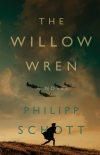The Willow Wren by Philipp Schott (electronic book reader TXT) 📗

- Author: Philipp Schott
Book online «The Willow Wren by Philipp Schott (electronic book reader TXT) 📗». Author Philipp Schott
The changes made no sense. Mind you, I had not been in the forest for two or three weeks, but at that time there had been more life about, much more. Then I saw it. Actually thinking back, I heard it first which caused me to walk over that way and look. I heard ravens cawing loudly. That had been the case the whole time I was in the forest, but now I began to tune in and wonder, because their noise was coming from one specific spot and was not the general swirling and swooping raven noise I was used to as they flew this way and that, alighting on branches to alert the others of my approach. Today they ignored me and were all clustered on a mound of something. As I approached, I could smell it too. It was entrails and deer heads. Dozens of them, maybe scores, in a grisly heap mixed with countless smaller bits, possibly from gutted rabbits. As I stepped through the new snow my boot prints became red because of the blood-soaked snow below. My mind immediately, irrationally flashed to the Rübezahl that the girl, Anna, had mentioned. But if he even existed, which I doubted, he caused deadly weather rather than the evisceration of deer. And then as quickly as that thought left, I thought of witches. But their diet was toadstools, strange herbs, slimy things and of course unwary children, not forest creatures. Besides this pile was much too large to be the handiwork of even a small group of old women, no matter how magical.
Then I saw the bullet casings. There were possibly hundreds of them. I do not know why I did not see them immediately. The larger ones I recognized as being from machine guns. Not the Rübezahl or witches then, but Russian soldiers. The Russians were hungry too, not as hungry as us perhaps, but hungry enough that it made sense for them to hunt in the winter when other meat was scarce and there was less cover for the wildlife. This seemed wildly excessive though. Did they really need to kill every animal? With machine guns? I became very angry, but then almost immediately, fear took over from anger. I suddenly felt deeply afraid and very alone and exposed and vulnerable. Just as I had done when I came across that encampment of deserters, I ran out of the forest faster than my skinny legs should have been able to move me.
Chapter Thirty-Seven
Spring 1946
Spring is normally the season of hope. Since the start of the war, however, it was the season of death, as that was when major new military offences began. But after the war, that was when starvation intensified as the food stored through the winter ran out and no wild foods were available yet. The ration cards still provided enough semolina and sugar to keep us alive, but Mama and Paul in particular were becoming alarmingly emaciated. She was breastfeeding him but was worried that her milk was too nutrient poor because of her own condition. Theodor and I made sure that she took a generous share of the food, arguing that it was for the baby’s sake, but even that was not nearly enough.
Spring brought rain and mud, so much mud. The condition of the roads deteriorated to the extent that it hampered our ability to reach farmers who were willing and able to trade, not that we had very much left to trade. Most of our valuables had been depleted, but two things gave us hope. First of all, Mama was preparing to travel to Leipzig to retrieve whatever was left there, as Papa had suggested. Secondly, we had lots of books. Astonishingly much of our library had made it from Leipzig to Colditz when Mama moved here in 1944. She had reasoned that the books were the most vulnerable to damage in the apartment and that they would be valuable for both entertainment in the dark days to come — which had proven itself true — and for knowledge as events could take unexpected turns, which was about to prove itself true. We had a number of excellent plant guides. The mild winter and the present rains were causing weeds to sprout quickly. With our books we knew which of these weeds were not truly weeds in the pejorative sense, but wild greens.
You did not need a book, however, to know about nettles. All but the most ignorant city dwellers know that once you get past the sting, nettles are an excellent source of vitamins and protein. The books were, however, helpful to identify Sedum telephium (Rote Fetthenne in German or, amusingly, “witch’s moneybags” in English) and Aegopodium podagraria (Giersch or “gout weed”). These were also nutritious and plentiful but were generally overlooked by the other foragers. We were careful to pick these when other people were not looking so as not to give this secret away. I suppose that is yet another of starvation’s effects — the evaporation of any sense of community spirit. The best place for this was just steps away on the banks of the Mulde. In previous times this was a spot where people let their dogs run to do their business, so gathering food there would have been unappetizing, but there were no dogs around at all anymore as nobody was able to feed them. This is another example of a dark grey cloud producing a silver lining. Mama, Theodor and I gathered as much of this weed bounty as we were able, and she combined it with the semolina to make a healthy stew. With this Paul began to look a little better as spring





Comments (0)